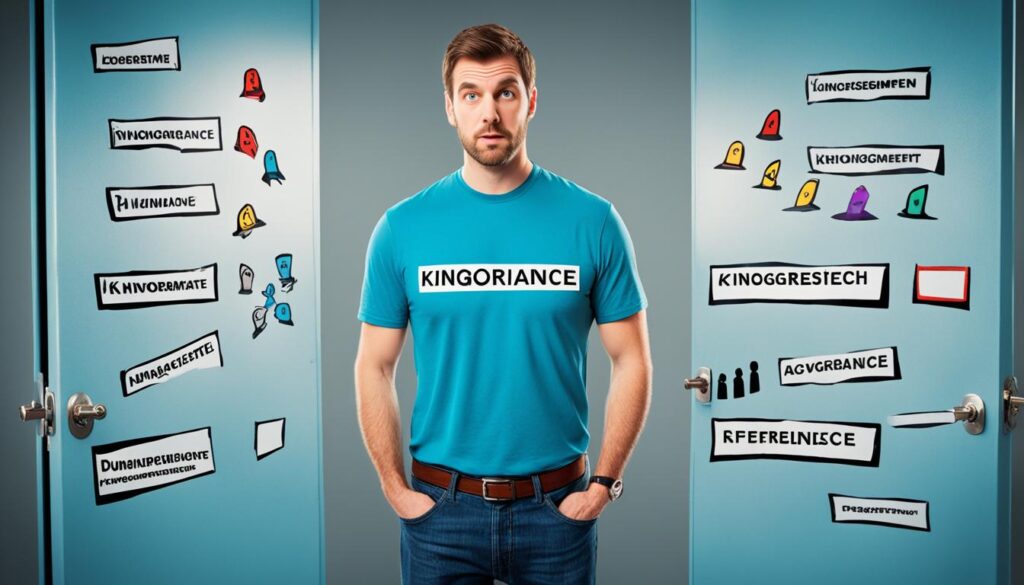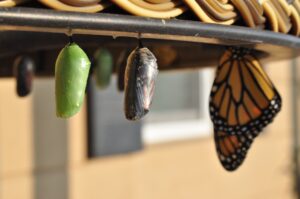Did you know 93% of Americans think they’re better drivers than average? This fact shows a common bias called the Dunning-Kruger effect1. It’s amazing how our minds can make us overestimate our skills.
The Dunning-Kruger effect was found in 1999. It shows people with little knowledge in a field often think they’re more skilled23. This bias isn’t just for driving. It happens in many areas, like humor, grammar, politics, and professional skills.
Did you know 90% of teachers think they’re better than their colleagues1? This overconfidence isn’t just for teachers. In a logic test, the lowest-scoring students thought they did better than 62% of others1.
The Dunning-Kruger effect isn’t always about overestimating oneself. It depends on the area and how much you know2. A 2018 study showed Americans with little political knowledge often thought they knew more, especially in partisan issues2.
Exploring this topic shows how common this effect is in our lives. It affects how we see ourselves, make decisions, and interact with others. Knowing about the Dunning-Kruger effect helps us grow and improve our thinking skills.
Key Takeaways
- The Dunning-Kruger effect leads to overestimation of abilities in areas of limited knowledge
- It affects various domains, including driving, teaching, and politics
- The effect doesn’t imply constant overestimation but varies by domain and knowledge level
- Cultural factors can influence the intensity of the Dunning-Kruger effect
- Recognizing this bias is essential for personal growth and improved self-awareness
What is the Dunning-Kruger Effect?
The Dunning-Kruger effect is a cognitive bias named by David Dunning and Justin Kruger in 1999. It happens when people with little knowledge or skill in a field think they’re much better than they are4.
Definition and Origin
This phenomenon comes from not knowing one’s own weaknesses. Dunning and Kruger did four experiments on grammar, logic, and humor. They found that those who scored lower thought they did better4.
Key Characteristics
The Dunning-Kruger effect has some main traits:
- Overestimation of abilities
- Failure to recognize expertise in others
- Difficulty in acknowledging one’s own mistakes
This feeling of being better than you are leads to bad choices and not wanting to hear feedback. It shows up in many areas, like finance and politics4.
Examples in Everyday Life
We see the Dunning-Kruger effect in many everyday situations:
| Domain | Example |
|---|---|
| Finance | Amateur investors overconfident in their market predictions |
| Social Media | Individuals sharing misinformation with certainty |
| Workplace | Employees overestimating their skills during performance reviews |
Studies show it affects medical residents, chess players, and debate teams too. A 2021 study found that those who can’t tell fake news from real news often don’t know they can’t tell the difference. They’re more likely to spread false info5.
Knowing about the Dunning-Kruger effect helps us spot our biases. It encourages us to better understand ourselves and keep learning.
The Psychology Behind the Dunning-Kruger Effect
The Dunning-Kruger effect shows us how our minds work and how we see ourselves. It tells us about how we handle information and judge our skills.
Cognitive Biases at Play
Cognitive biases greatly affect what we see. In a study, those who did worst on tests thought they did great, placing themselves in the 62nd percentile when they were really in the 12th6. This shows how our brains can trick us into thinking we’re more skilled than we are.
Metacognition and Self-Assessment
Metacognition is thinking about our own thinking. It’s key for knowing how good we are at things. Experts are usually better at judging themselves than beginners, and women often judge themselves more accurately than men6. Having strong metacognitive skills helps fight the Dunning-Kruger effect.
The Role of Ignorance in Overconfidence
Not knowing something can make us overconfident. A study showed most people thought they knew made-up terms, showing how easy it is to overestimate our smarts6. This overconfidence can lead to big problems, like in finance where only a few traders make it long-term7.
Learning about these psychological things helps us know ourselves better and fight biases. By knowing our limits and asking for feedback, we can improve how we see ourselves and grow personally.
Dunning-Kruger Effect in Various Domains
The Dunning-Kruger effect shows up in many parts of life, affecting our growth and skills at work. I’ve seen it in schools, workplaces, and how we interact with others.
In schools, students who don’t do well often think they’re better than they are. A study found that those at the bottom of the class thought they did much better than they actually did8.
At work, people might think they’re more skilled than they really are. This can make it hard to get better at their jobs. In a study on medical students, most thought they were good at interviews, even after they did them9.
Culture also affects it. In East Asia, people often don’t see their own strengths or how likable they are. This shows how culture can shape our views on ourselves9.
| Domain | Manifestation of Dunning-Kruger Effect | Impact on Personal Development |
|---|---|---|
| Education | Low performers overestimate abilities | Hinders accurate self-assessment |
| Workplace | Employees overrate skills | Challenges in career progression |
| Social Interactions | Overconfidence in social skills | Potential communication issues |
Now, with technology, things get even more complicated. Tools like FitBit and Instagram give us numbers to check ourselves against. But, they don’t cover everything about growing personally, so we might still be biased9.
Knowing about the Dunning-Kruger effect in different areas is key to getting better. It teaches us to be humble about our skills and knowledge. This helps us keep learning and getting better at what we do.
How the Dunning-Kruger Effect Impacts Decision Making
The Dunning-Kruger effect affects how we make decisions in life. It can make us overconfident and lead to bad choices. Let’s look at how it impacts relationships, careers, and social media.
Personal Relationships and Communication
In personal relationships, the Dunning-Kruger effect can cause misunderstandings. People might think they’re better at talking than they really are, leading to fights. A study showed that people often think their views are fair, even on tough topics like racism and sexism10. This can make relationships harder and communication less effective.
Professional Settings and Career Development
The workplace isn’t safe from the Dunning-Kruger effect. It can affect career growth and decision-making. Workers who think they’re better than they are might take on jobs they’re not ready for. This can lead to bad performance and conflicts with others11. In dangerous jobs, overconfidence can be a big risk to oneself and others11.
Research shows this effect is common in many areas. Students, doctors, and office workers often don’t see their true abilities10. This can mean not studying enough for exams or thinking you’re doing better at your job than you are. This can stop you from growing professionally.
Social Media and Information Sharing
On social media, the Dunning-Kruger effect can spread misinformation. People with little knowledge on topics like vaccines or politics often speak out strongly10. This can affect health decisions and society. When people share wrong info, it can create groups of people believing the same wrong things.
Knowing about the Dunning-Kruger effect helps us make better choices. By understanding our limits and always learning, we can make smarter decisions in our personal lives, careers, and online.
Overcoming the Dunning-Kruger Effect
Starting our journey of self-improvement means first recognizing our own limits. A 1999 study found that people who didn’t do well in tests thought they scored way higher than they actually did. They overestimated their skills in things like solving problems, being funny, and grammar12. This shows how crucial it is to know our own strengths and weaknesses.
Developing Self-Awareness
To fight the Dunning-Kruger effect, I need to understand that not everyone is an expert. About 25% of people think they’re among the best in sports, math, or driving13. By thinking about my thoughts and listening to others, I can get a clearer view of my abilities. Reflecting on my own thinking is key to knowing myself better and being honest about my skills13.
Seeking Feedback and Continuous Learning
Getting honest feedback is essential to see where I stand. It shows me what I need to work on and fills in the gaps in my knowledge. In the first Dunning-Kruger study, those who scored the lowest in logic tests got better after training and stopped overrating themselves12. This proves that learning and experience can make us more aware of our strengths and weaknesses. By seeing feedback as a chance to grow, I can improve my thinking.
Embracing Intellectual Humility
Being humble in our knowledge is key to beating the Dunning-Kruger effect. Studies on making decisions show that we often choose what we want to believe and ignore the rest, leading to self-deception14. By accepting that there’s always more to learn, I can stop overestimating my skills. This attitude leads to discovering new things and real personal growth.
FAQ
What is the Dunning-Kruger effect?
What are the key characteristics of the Dunning-Kruger effect?
Can you provide examples of the Dunning-Kruger effect in everyday life?
What cognitive biases contribute to the Dunning-Kruger effect?
Why is metacognition important in understanding the Dunning-Kruger effect?
How does the Dunning-Kruger effect impact personal relationships and communication?
How can the Dunning-Kruger effect hinder career development?
How can the Dunning-Kruger effect contribute to the spread of misinformation on social media?
What strategies can be used to overcome the Dunning-Kruger effect?
Source Links
- The Dunning-Kruger Effect Isn’t What You Think It Is – https://www.scientificamerican.com/article/the-dunning-kruger-effect-isnt-what-you-think-it-is/
- Dunning-Kruger effect | Definition, Examples, & Facts – https://www.britannica.com/science/Dunning-Kruger-effect
- The Dunning-Kruger Effect Explained | Splunk – https://www.splunk.com/en_us/blog/learn/dunning-kruger-effect.html
- Examples of the Dunning–Kruger Effect – https://dovetail.com/research/dunning-kruger-effect-examples/
- The Dunning-Kruger effect and its discontents | BPS – https://www.bps.org.uk/psychologist/dunning-kruger-effect-and-its-discontents
- Dunning-Kruger Effect: Why Incompetent People Think They Are Superior – https://www.verywellmind.com/an-overview-of-the-dunning-kruger-effect-4160740
- Dunning–Kruger Effect – The Decision Lab – https://thedecisionlab.com/biases/dunning-kruger-effect
- PDF – https://www.ijpsy.com/volumen20/num1/532/the-dunning-kruger-effect-in-emirati-college-EN.pdf
- The Dunning-Kruger Effect in Our Digital Domain – Putting Methods to the Madness – https://sites.lsa.umich.edu/qmss/2020/07/10/the-dunning-kruger-effect-in-todays-digital-domain/
- What Is the Dunning-Kruger Effect? – https://www.webmd.com/mental-health/dunning-kruger-effect-what-to-know
- Dunning-Kruger Effect: Definition, Examples, and Tips – Work Life by Atlassian – https://www.atlassian.com/blog/productivity/dunning-kruger-effect
- What Is the Dunning Kruger Effect and How To Overcome It – Talkspace – https://www.talkspace.com/blog/what-is-the-dunning-kruger-effect-and-how-to-overcome-it/
- What is the Dunning-Kruger Effect and how to overcome it? – https://neurofied.com/the-dunning-kruger-effect/
- David Dunning: Overcoming Overconfidence – https://www.openmindmag.org/articles/david-dunning-on-expertise






